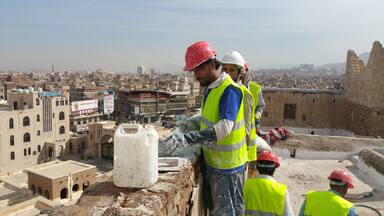UNESCO Mobilizes Funds and Expertise to Safeguard Yemen’s Cultural Heritage
UNESCO profoundly regrets the loss of life and property in a number of historic centers in Yemen, including in the World Heritage sites of Zabid, Shibam, and Sana’a, in recent days following exceptional extreme weather conditions in the country.
The resulting damage is endangering the lives of the inhabitants of these historic centers, leaving some of them without adequate shelter and exacerbating the already-dire situation for many others. The weather conditions also threaten the survival of Yemen’s unique cultural heritage, which is a testimony of human creativity and adaptability to the country’s varied landscape and environmental conditions.
UNESCO acknowledges the need for collective efforts to avoid further losses and implement risk mitigation mechanisms to ensure that the inhabitants of these historic centers can continue to live and conserve their heritage as they have done for centuries. Along with its international partners, UNESCO has been mobilizing resources and expertise to safeguard Yemen’s cultural heritage by implementing a number of projects with a focus on urban rehabilitation of private houses and capacity building for the local authorities.
The Yemeni historical centers of Aden, Sana’a, Shibam, and Zabid are benefitting from an ongoing cash-for-work project funded by the European Union and implemented in partnership with the Social Fund for Development (SFD) and specialized local authorities. The project activities actively safeguard private houses and public spaces in the four cities and create income opportunities for 4,000 youth inhabitants, with more than 30 ongoing working sites in the Old City of Sana’a alone. The three-year project is continually adapting to the changing needs of the targeted cities.
UNESCO has been mobilizing the Heritage Emergency Fund to quickly and effectively respond to crises resulting from armed conflicts and disasters in the country. Along with our partners, the organization has intervened in Al-Qasimi area of the Old City of Sana’a and the Historic Town of Zabid to save 30 buildings from collapse. Following the heavy flash floods of April 2020 in Sana’a, the second phase of intervention has been launched with technical studies of residential areas located mainly on the west bank of Al-Sailah, which will be followed with rehabilitation activities scheduled to be launched in partnership with the Public Works Project (PWP) and GOPHCY.
UNESCO continues to closely follow the situation and coordinate with its local partners to assess the needs and mobilize adequate resources and expertise.

